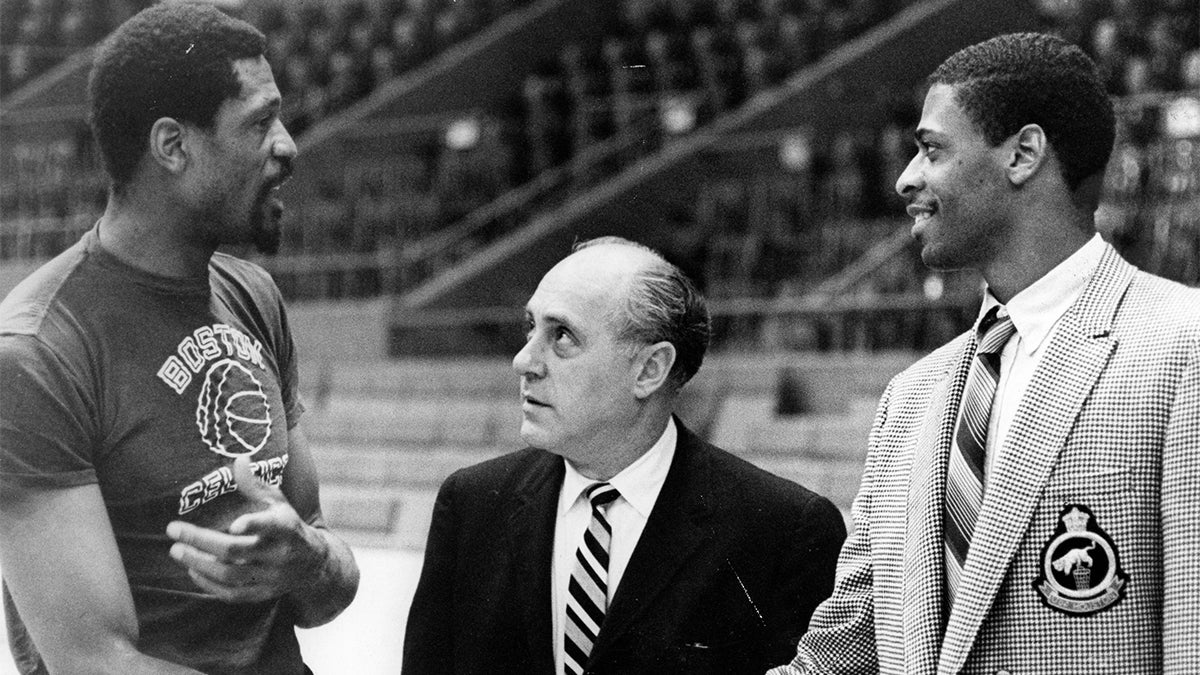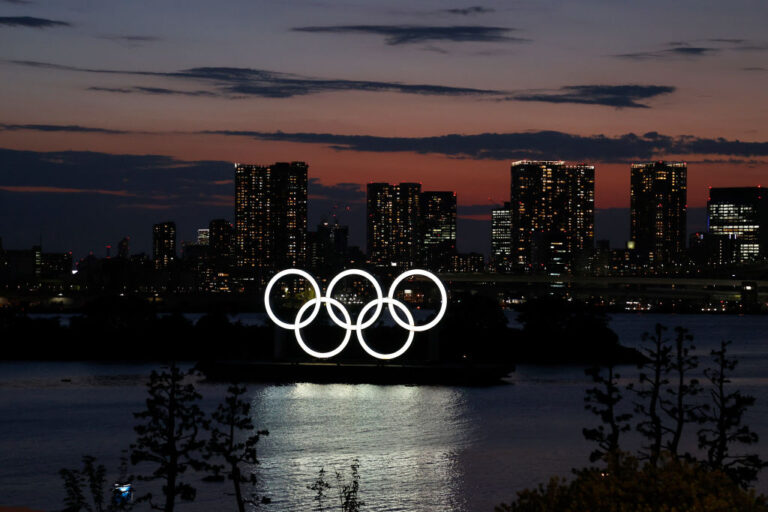History-maker himself, Celtics Bill Russell supported athlete activism
Why this matters
In 2018, Global Sport Matters and the Global Sport Institute commemorated the 50th anniversary of the seminal moment of the Mexico City Games, when Americans John Carlos and Tommie Smith raised a black-gloved fist from the medals podium. We took a look back at the year from a global sporting perspective.
From the World Series helping a wounded Detroit heal to athletic innovations that trace their origins to those Olympics, 1968 served as a critical pivot point in the role sports plays in society and introduced the modern era of athlete activism. Read all the stories here.
In the spring of 1968, basketball star Bill Russell and social activist Harry Edwards appeared headed in different directions.
The 26-year-old Edwards was a sociology professor at San Jose State University, a school that boasted the track and field dynasty nicknamed “Speed City.” Its roster of athletes included Lee Evans, John Carlos and Tommie Smith. The last two would soon make headlines by raising gloved fists on the medals stand in Mexico City.
Edwards had called for the restoration of Muhammad Ali’s boxing title, which had been stripped from him for his refusal to be drafted into the Vietnam War; keeping apartheid-led South Africa out of the Olympics; and seeking the ouster of International Olympic Committee chairman Avery Brundage.
In comparison, Russell was a season away from hanging up his sneakers on a 13-year playing career with the Boston Celtics in which he won a record 11 titles. After coming into the league in 1956, Russell become the first black coach in NBA history in 1966, serving as a player coach during his final three seasons. But if anyone thought the all-star center was about to rest on his laurels in 1968, they didn’t know Russell very well.
That Russell would reach out to Edwards wasn’t that surprising. During the summer of 1967, he had joined several top black athletes, including Jim Brown, Bobby Mitchell and Kareem Abdul-Jabbar, then known as Lew Alcindor. The group had gathered in Cleveland to meet with Ali about his decision not to enter the draft. The Department of Justice had already rejected his conscientious objector request, and Ali had refused compromise proposals, calling the U.S. war effort imperialist.
After the group talked with the boxing star, Russell told reporters he found Ali’s concerns genuine. He said the boxer was at peace with himself, even if his controversial stand could result in jail time.
Russell took a similar approach with Edwards and the track stars from Speed City. Though some of them were calling for a boycott of the Olympic Summer Games in Mexico City, Russell refused to criticize them publicly even though he had won a gold medal as captain of the U.S. basketball team 12 years earlier in Melbourne, Australia.
On and off the court, Russell believed that games, and often life itself, came down to a few key moments.
When Dr. Martin Luther King was assassinated in Memphis, Tennessee, the first game of the playoff series between the Celtics and the Philadelphia 76ers, which pitted Russell against rival Wilt Chamberlain, was nearly postponed. When it was decided at the 11th hour to play, Russell held a closed-door meeting with his team, which had seven African-Americans on its roster. When insensitive comments threatened to drive his teammates apart, Russell reminded them “this isn’t black and white. It’s an American problem.”
The Celtics hung together and won Game 1 against the favored 76ers. When the NBA postponed Game 2 for a national day of mourning, Russell, as well as Chamberlain, attended King’s funeral in Atlanta. The Celtics’ player-coach reached out to Boston’s black neighborhoods, too.
Russell’s teammates saw their player-coach was as well-versed as anyone about the Vietnam War, the struggle for civil rights and the changing role of the black athlete in sports. If anything, his focus on key moments off the court made him a better coach. Backup center Wayne Embry said Russell was “man enough to put away some of his stubbornness and pride,” and reach out to his teammates in formulating a winning game plan.
After defeating the Philadelphia 76ers in the Eastern Conference finals, the Celtics faced the faster, more elusive Los Angeles Lakers for the NBA title. Instead using a dominating center like Philadelphia’s Chamberlain, the Lakers alternated Mel Counts and Darrall Imhoff in the low post. Los Angeles’ main weapons were guard Jerry West and forward Elgin Baylor, who were joined by guards Archie Clark, Freddie Crawford and Gail Goodrich.
After the Celtics won Game 3 in Los Angeles, West began to take control. The future Hall of Famer scored 38 points, with Baylor chipping in with 30, as the Lakers squared the series at two games apiece.
“If we can rebound, we can win,” West said afterward. “We’re little, but we match up well against Boston. We’re quick and we shoot well, and that can be enough in a seven-game series.”
It could have played out that way if it hadn’t been for Russell. At the time, few realized what a well-rounded athlete Russell was. Track and field, not basketball, had been his first love at the University of San Francisco. Team members there received a buttoned sweater with S.F. stitched across the front for making the track team. To secure such duds, Russell high-jumped 6 feet, 7 inches. For meets, he wore the sweater, tracksuit, silk scarf and sunglasses.
Celtics teammate and fellow Hall of Famer John Havlicek said Russell “could have been a decathlon champion. He could also broad jump 24 feet. He did the hurdles in 13.4 seconds. … He just might be the fastest man on the Celtics.”
The ’68 NBA Finals became a battle of all-stars: the Celtics’ Russell and Havlicek against the Lakers’ West and Baylor. In Game 5, despite playing on a twisted ankle, West score 35 points, rallying Los Angeles from an 18-point deficit. The Lakers were down four with less than a minute to play when West stole the ball and found Baylor. After another Lakers’ steal, West scored to send the game into overtime.
In the extra session, though, Russell turned the tables once again, blocking a shot by Baylor and Boston held on for a 120-117 victory and the series lead.
Before the next game, Russell proved adept with the X’s and O’s, too. He moved Sam Jones to forward, where he could post up Goodrich. That forced the Lakers to go with a taller yet slower lineup. Even though the Lakers rallied late, the Celtics held on to capture the championship and the first for Russell as coach.
After the series ended, 76ers owner Irving Kosloff called Lakers owners Jack Kent Cooke. Would Cooke be interested in trading for Wilt Chamberlain? Cooke jumped at the chance, moving Imhoff, Clark and Jerry Chambers to Philadelphia for the big man. Overnight, the Lakers were transformed from a run-and-gun outfit to a squad with an imposing frontcourt of Chamberlain and Baylor with West at guard. The NBA soon became defined as East versus West, the Boston Celtics versus the Los Angeles Lakers and Russell versus Chamberlain.
That offseason Russell was named Sports Illustrated’s Sportsman of the Year. Surprisingly, he finished a distant ninth in voting for the Hickok Belt, perhaps the most prestigious athletic award at the time. Given annually by the Hickok Manufacturing Company of Rochester, N.Y., which specialized in men’s belts and accessories, the prize itself was made of alligator skin, with a five-pound gold buckle, and encrusted with diamonds, rubies and sapphires, which some winners removed to make necklaces and earrings for their wives.
Not that awards, even ones with rubies and sapphires, mattered much to Russell. After winning in 1968, the Celtics’ player-coach was asked if he had anything left to accomplish.
“Well, I don’t know because I never had a goal,” he replied. “To tell you the truth, it’s been a long time since I tried to prove anything to anybody. I know who I am.”
Tim Wendel is the author of 13 books, including “Summer of ’68: The Season that Changed Baseball, and America, Forever.”



